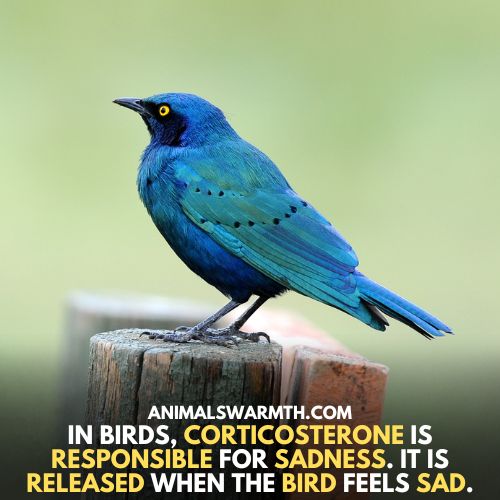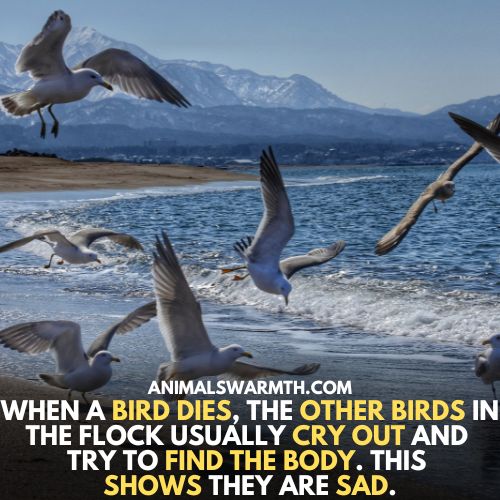Contents
Summary
- Birds can get sad because they have a complex brain that releases corticosterone (the hormone of sadness).
- The death of a baby bird or mate makes a bird sad.
- When birds are rehomed or their owners leave, they also get sad. Birds sometimes feel sadness in cages.
Do birds feel sadness? This is a question that many people have asked, and there is proof that they do.
Through scientific and observational studies, it has been shown that birds exhibit signs of sadness. This emotion is regulated by hormones in the brain, just like humans.
When a bird experiences something sad, it will typically withdraw from social interaction and isolate itself from the group. If you’re curious to learn more about this topic, keep reading!
Do Birds Feel Sadness? Scientific Evidence
According to research, a bird’s brain is very similar to a human’s. In both humans and birds, the amygdala is responsible for processing emotions. The hippocampus is also responsible for forming memories and encoding emotional experiences.
This means that birds are capable of feeling sadness just like humans do.
Birds have a lot of the same emotions as humans. They experience happiness, anger, fear, and, yes, sadness. This emotion is regulated by hormones in the brain, just like humans.
The hormone that is responsible for sadness in birds is called corticosterone. It’s a stress hormone released when the bird is experiencing something stressful or sad. This hormone will make the bird feel lethargic and unmotivated. It’s similar to the human emotion of sadness.
Thus, birds can experience sadness like other animals.

Do Birds Feel Sadness? Observational Studies
Not only do scientific studies show that birds feel sadness, but there are also observational studies that support this claim.
One study observed the mourning dove. The mourning dove is a bird that typically mates for life. If one of the mates dies, the other will go through a period of mourning.
During this time, the bird will isolate itself and stop participating in social activities. It will also call out loudly for its lost mate. This study shows that birds do indeed feel sadness when they lose someone they love.
There have been other studies to show that birds feel sadness. One study looked at how chickens react to being separated from their flock. The study found that the chickens became agitated and sad when separated. They would cry out and try to find their way back to the flock.
This showed that birds dislike being isolated from their social groups.
Another study looked at how parrots react to being alone. The study found that parrots become very sad when they are alone.
They will pull out their feathers and cry out loudly. This shows that birds do not like to be alone and can get very stressed when they are.
Do Birds Get Sad If Their Babies Die? Bird’s Sadness
Birds also feel sadness when their babies die. This was shown in a study on the mourning dove. In the wild, it’s not uncommon for baby birds to die. This is usually due to predation or disease.
When a mother bird loses her baby, she will go through a period of mourning. She will stop eating and isolate herself from the rest of the flock during this time.
She will also cry out loudly for her lost baby. This shows that birds do indeed feel sadness when they lose their young.
Many bird species have shown signs of sadness when their chicks die. In various studies, many birds such as jaybirds, pigeons, penguins, and ospreys have reacted to the death of their baby.
It has been revealed that the parent bird would stop eating and become very thin. They would also stop singing and nesting. The osprey parents have been seen to perch above their empty nest.
Thus, observational studies prove that birds can get sad when their babies die.

Do Birds Get Sad When Their Babies Leave The Nest?
Birds also feel sadness when their babies leave the nest. This is because they have spent so much time caring for them and now they are gone.
When a bird leaves their nest, it is a big deal. The mother bird has to say goodbye to her baby and watch it leave. This can be a very emotional time for the mother bird.
She will usually cry out and try to follow her baby. This shows that she is sad and doesn’t want her baby to leave.
When the juvenile bird leaves the nest, it doesn’t mean the parent bird will abandon their child. The parent bird will keep an eye on their child and make sure it is safe.
The parent bird will also continue to feed their juvenile even after it leaves the nest. This is because the juvenile is still learning how to fend for itself and needs the help of its parents.
This is similar to how humans feel when their children leave home. It can be a very hard and emotional time for the parent.
Do Birds Get Sad When Rehomed?
Birds also feel sadness when they are rehomed. This is because they have to leave their home and everything they know.
When a bird is rehomed it gets sad. It is usually because the previous owner can no longer care for it. This can be a very stressful time for the bird. They have to leave everything they know and start all over again. They will have to adjust to a new home and a new owner.
They usually cry out and try to find their way back to their old home. This shows that they are sad and don’t want to leave.
This is similar to how humans feel when forced to move to a new place. It can be very hard and emotional for them.
Many observational studies on birds show they do indeed get sad when they are rehomed.
One study observed a group of parrots that were rehomed. The study found that the parrots became very sad and withdrawn. They would stop eating and pull out their feathers. This showed that the parrots were extremely stressed and unhappy.
It shows that birds do get sad when they are rehomed. They have a hard time adjusting to their new situation and often become stressed. This can lead to them becoming withdrawn and even sick.
Do Birds Get Sad When Another Bird Dies?
Birds also feel sadness when another bird dies. This is because they have formed a close bond with the other bird and now it is gone.
When a bird dies, the other birds in the flock usually cry out and try to find the body. This shows they are sad and don’t want their friend to be gone.
They will also build a special funeral mound for their friend. This is similar to how humans bury their dead.
Birds do get sad when another bird dies. They form strong bonds with each other and grieve when they lose a friend.

According to a study, crow funerals are very similar to human funerals.
It has been observed in a group of crows after one of their flock mates died. The study found that the crows would gather around the body of their friend and cry out for 15-20 minutes. They would also build a special funeral mound for their friend. This showed that the crows were sad and didn’t want their friend to be gone.
This study shows that birds do indeed get sad when another bird dies. They form close bonds with each other and grieve when they lose a friend.
Do Birds Get Sad Being In A Cage?
Birds also get sad when they are in a cage. This is because they are very social creatures and need to be around others.
When a bird is in a cage, it is usually alone. This can be very stressful for the bird.
The bird will often cry out and try to escape from its cage. According to Peta Asia, the birds in cages will also pull out their feathers and scream. They show self-destructive behavior. This is because they are so stressed and sad.
Do Birds Get Sad When Owners Leave?
Birds also get sad when their owners leave. This is because they are very social creatures and need to be around others.
They have formed a close bond with their owner and now they are gone.
The bird will often cry out and try to find its owner. This shows that the bird is sad and doesn’t want to be alone.
How Can You Tell If A Bird Is Sad? Signs of Sadness
There are several ways to tell if a bird is sad.
The first way is by observing the bird’s behavior. A sad bird will often be very withdrawn and will stop eating. It may also pull out its feathers.
The second way to tell if a bird is sad is by listening to the bird’s cries. A sad bird will often cry out for its owner.
The third way to tell if a bird is sad is by looking at the bird’s cage. A sad bird will often try to escape from its cage.
Birds also exhibit other signs of sadness, such as:
- Isolating themselves from the group
- Sleeping more than usual
- Loss of interest in preening or grooming themselves
If you see a bird exhibiting any of the signs mentioned above, they’re likely experiencing this emotion. If you notice any of these signs, taking the bird to a veterinarian is important.
Conclusion
In conclusion, birds do feel sadness. This is shown through their behavior when they are rehomed when another bird dies, and when they are in a cage.
They have a hard time coping with these situations and often become stressed. This can lead to them becoming withdrawn and even sick.
If you have a bird, it is important to try to make sure it is happy and not too stressed. This will help to keep it healthy and prevent it from getting sad.
Have you ever observed the emotion of sadness in your pet birds? Share your thoughts in the comments.
References
- Herculano-Houzel, S. (2020). Birds do have a brain cortex—and think. Science, 369(6511), 1567-1568.
- The mourning dove appears to mourn its dead mate By JOAN MORRIS – The Mercury News
- Can Chicken Live Alone? – Chicken Guard
- The Juvenile Stage: What Happens When Baby Birds Leave The Nest? – Lyric Wild Bird Food
- No-Fly Zone by Charles Bergman
- Crow Funeral – with Tony Angell – Bird Note
- Flying in for the Crow Funeral. Can crows help explain human interest and rituals surrounding death? by Anne Marshall-Chalmers
